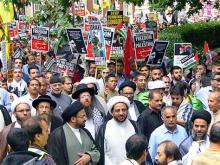
Human beings live in Gaza. Right now, it’s hard to even mention this fact. When the talk of “animals” is even heard coming from the – very experienced – defense minister, and is the predominant theme on the street and in the television studios, it’s hard to talk about Gaza residents as human beings.
The truth is, “animals” isn’t even a appropriate term for the crimes committed by the Hamas invaders on Saturday: No animal commits such acts of savagery as they did. Still, Gaza is home to more than two million people, about half of whom are descendants of refugees, which is something that should also be kept in mind now, despite the difficulty.
Gaza is plagued with Hamas, and Hamas is a despicable organization. But most residents of the Gaza Strip are not like that. Before we start flattening and destroying and uprooting and killing, we should take this into account. The reckoning must be with Hamas, not with all Gazans. One’s heart must go out to them, regardless of one’s profound solidarity with Israel’s victims.
- Israel can’t imprison two million Gazans without paying a cruel price
- IDF ramps up strikes on Gaza, prepares for ground invasion
- Israeli strikes in Gaza kill over 230 Palestinians and wound 1,700
It should be possible to stand with the residents of the south, while still remembering that living on the other side are human beings just like them. We should be able to fear for the fate of Gazans and distinguish between them and their Hamas leadership. It should be possible, even in the current atmosphere, to speak about Gaza in human terms.
I visited the south this week, from Sderot to Re’im, and was completely horrified. It was impossible not to be. I met people who went through an unforgettable nightmare and my heart goes out to them. But I also couldn’t help thinking that just a few kilometers away from them, a much bigger disaster is befalling the inhabitants of Gaza. The images from Gaza are already shocking. Rumor has it that there is already white phosphorus in the streets. But most of all, it’s the helplessness of the people who have nowhere to run to, no way to protect their children, nowhere to hide. In Gaza there is no refuge and no way out.

This week in the south there was a red alert and we ran to a safe room every few minutes. The sirens wailed in Tel Aviv too. In Gaza, there is no red alert, no siren and no safe room. Hamas is the one criminally responsible for this, but the population is completely abandoned to its fate – women, children and the elderly with nothing at all to shelter them from the bombardments. Try to imagine it: relentless bombardments with no prior warning. Indiscriminate bombings, as the IDF spokesperson says, “The emphasis is on damage, not on precision.”
It’s hard to imagine the terror in Sderot. It’s even harder to imagine the terror in Gaza’s Rimal district. There needn’t be a competition over which people are suffering more in order to recognize that the suffering in Gaza is staggering too. For years, I visited homes there. I met honest, brave, determined people with a special sense of humor. I’ve documented terrible suffering in many places in the world, but the people’s spirits there never fell.
Seventeen years of the blockade closed Gaza off to me. I presume it has changed since them. A new generation was born into even greater despair. But is it possible to remain indifferent, even to joke in some cases, at the sight of the images from Gaza? How is this possible? How is it possible to forget that these are human beings whose ancestors were expelled from their land and placed in refugee camps where they would remain?

These were human beings whom Israel dispossessed and expelled, whom it conquered again in their land of refuge and then turned into animals in a cage. They’ve experienced indiscriminate bombardments before, but now the worst of all is ahead of them. Israel has already announced that all the restraints it supposedly used in previous attacks will be lifted this time. Yes, hundreds of Gazans committed atrocious crimes, an outgrowth of 17 years of blockade and 75 years of suffering, with a bloody past and no present or future. But not all of a Gaza is to blame.
As I sit in my neighbor’s safe room in Tel Aviv, I can’t help thinking about my friend Munir, who has nowhere to run to in his home in Lakiya, or even the ability to run after the stroke that he suffered. I am thinking about the Gazans now when it seems like no one else in the world cares what happens to them anymore.
By Gideon Levy Oct 12, 2023 Haaretz

